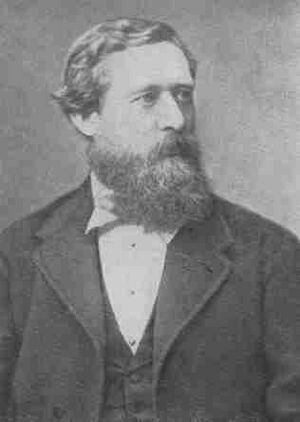Aleksandr Ziloti and Karl Klindworth: Difference between pages
m (Text replacement - "Russian State Archive of Literature and Art" to "{{RUS-Mcl}}") |
No edit summary |
||
| Line 1: | Line 1: | ||
{{picture|file= | {{picture|file=Karl Klindworth.jpg|caption='''Karl Klindworth''' (1830-1916)}} | ||
German pianist, conductor and teacher (b. 25 September 1830 {{NS}} in [[Hannover]]; d. 27 July 1916 {{NS}} in Stolpe, near Oranienburg), born '''''Karl Ludwig Klindworth'''''. | |||
==Biography== | ==Biography== | ||
During his youth, Klindworth was trained to play the violin, but later taught himself the piano. At the age of 17 he became conductor of a travelling theatre company, and from 1852 to 1854 he studied under [[Franz Liszt]] at Weimar. | |||
After moving to [[London]] in 1854, he spent fourteen years as a conductor, where audiences generally found his programmes of traditional works juxtaposed with modern music too challenging for popular tastes. However, he was highly rated by fellow musicians, including [[Richard Wagner]] and [[Edward Dannreuther]]. | |||
==Tchaikovsky and | ==Tchaikovsky and Klindworth== | ||
In | In 1868, Klindworth was invited by [[Nikolay Rubinstein]] to join the staff of the [[Moscow]] Conservatory, where he befriended Tchaikovsky, and made several piano arrangements of Tchaikovsky's works. Together with [[Hans von Bülow]], Klindworth endorsed Tchaikovsky's overture-fantasia ''[[Romeo and Juliet]]'' to the [[Berlin]] publishers [[Bote & Bock]] when the score was sent to them by [[Nikolay Rubinstein]] in May 1870. [[Bote & Bock]] eventually published the full score of the overture (revised version) in 1871, thereby laying the foundation-stone of Tchaikovsky's growing fame in Germany. | ||
After [[Nikolay Rubinstein]]'s death, Klindworth returned to Germany where he became co-conductor of the [[Berlin]] Philharmonic Orchestra in 1882, and founded his own piano conservatory in the German capital two years later. | |||
==Dedications== | ==Dedications== | ||
Tchaikovsky dedicated two of his piano works to Karl Klindworth: | |||
* ''[[Capriccio]]'' in G-flat major, for piano, Op. 8 (1870) | |||
* [[Grand Sonata]] in G major, for piano, Op. 37 (1878). | |||
==Correspondence with Tchaikovsky== | ==Correspondence with Tchaikovsky== | ||
4 letters from Tchaikovsky to Karl Klindworth have survived, dating from 1878 to 1890, all of which have been translated into English on this website: | |||
* '''[[Letter 932a]]''' – 7/19 October 1878, from [[Moscow]] | |||
* '''[[Letter 2829a]]''' – 9/21 December 1885, from [[Maydanovo]] | |||
* '''[[Letter | * '''[[Letter 3976a]]''' – 27 November/9 December 1889, from [[Moscow]] | ||
* '''[[Letter 4038a]]''' – 16/28 February 1890, from [[Florence]]. | |||
* '''[[Letter | |||
* '''[[Letter | |||
* '''[[Letter | |||
2 letters from Klindworth to the composer, dating from 1889 and 1890, are preserved in the {{RUS-KLč}} at [[Klin]] (a{{sup|4}}, Nos. 1456–1457). | |||
==Bibliography== | ==Bibliography== | ||
* {{bib| | * {{bib|1965/26}} (1965) | ||
* {{bib| | * {{bib|2000/22}} (2000) | ||
* {{bib| | * {{bib|2008/13}} (2008) | ||
==External Links== | ==External Links== | ||
* [[wikipedia: | * [[wikipedia:Karl_Klindworth|Wikipedia]] | ||
* {{IMSLP| | * {{IMSLP|Klindworth,_Karl}} | ||
* {{viaf|24868466}} | |||
[[Category:People| | [[Category:People|Klindworth, Karl]] | ||
[[Category:Conductors| | [[Category:Conductors|Klindworth, Karl]] | ||
[[Category:Correspondents| | [[Category:Correspondents|Klindworth, Karl]] | ||
[[Category:Dedicatees| | [[Category:Dedicatees|Klindworth, Karl]] | ||
[[Category:Pianists| | [[Category:Pianists|Klindworth, Karl]] | ||
__NOTOC__ | |||
Revision as of 22:43, 15 August 2023
German pianist, conductor and teacher (b. 25 September 1830 [N.S.] in Hannover; d. 27 July 1916 [N.S.] in Stolpe, near Oranienburg), born Karl Ludwig Klindworth.
Biography
During his youth, Klindworth was trained to play the violin, but later taught himself the piano. At the age of 17 he became conductor of a travelling theatre company, and from 1852 to 1854 he studied under Franz Liszt at Weimar.
After moving to London in 1854, he spent fourteen years as a conductor, where audiences generally found his programmes of traditional works juxtaposed with modern music too challenging for popular tastes. However, he was highly rated by fellow musicians, including Richard Wagner and Edward Dannreuther.
Tchaikovsky and Klindworth
In 1868, Klindworth was invited by Nikolay Rubinstein to join the staff of the Moscow Conservatory, where he befriended Tchaikovsky, and made several piano arrangements of Tchaikovsky's works. Together with Hans von Bülow, Klindworth endorsed Tchaikovsky's overture-fantasia Romeo and Juliet to the Berlin publishers Bote & Bock when the score was sent to them by Nikolay Rubinstein in May 1870. Bote & Bock eventually published the full score of the overture (revised version) in 1871, thereby laying the foundation-stone of Tchaikovsky's growing fame in Germany.
After Nikolay Rubinstein's death, Klindworth returned to Germany where he became co-conductor of the Berlin Philharmonic Orchestra in 1882, and founded his own piano conservatory in the German capital two years later.
Dedications
Tchaikovsky dedicated two of his piano works to Karl Klindworth:
- Capriccio in G-flat major, for piano, Op. 8 (1870)
- Grand Sonata in G major, for piano, Op. 37 (1878).
Correspondence with Tchaikovsky
4 letters from Tchaikovsky to Karl Klindworth have survived, dating from 1878 to 1890, all of which have been translated into English on this website:
- Letter 932a – 7/19 October 1878, from Moscow
- Letter 2829a – 9/21 December 1885, from Maydanovo
- Letter 3976a – 27 November/9 December 1889, from Moscow
- Letter 4038a – 16/28 February 1890, from Florence.
2 letters from Klindworth to the composer, dating from 1889 and 1890, are preserved in the Tchaikovsky State Memorial Musical Museum-Reserve at Klin (a4, Nos. 1456–1457).
Bibliography
- Unveröffentlichte Briefe Karl Klindworths an Tschaikowsky (1965)
- Bisher unbekannte Briefe P. I. Čajkovskijs (2000)
- I will not alter a single note. New information on the History of Čajkovskij's First Piano Concerto (2008)

